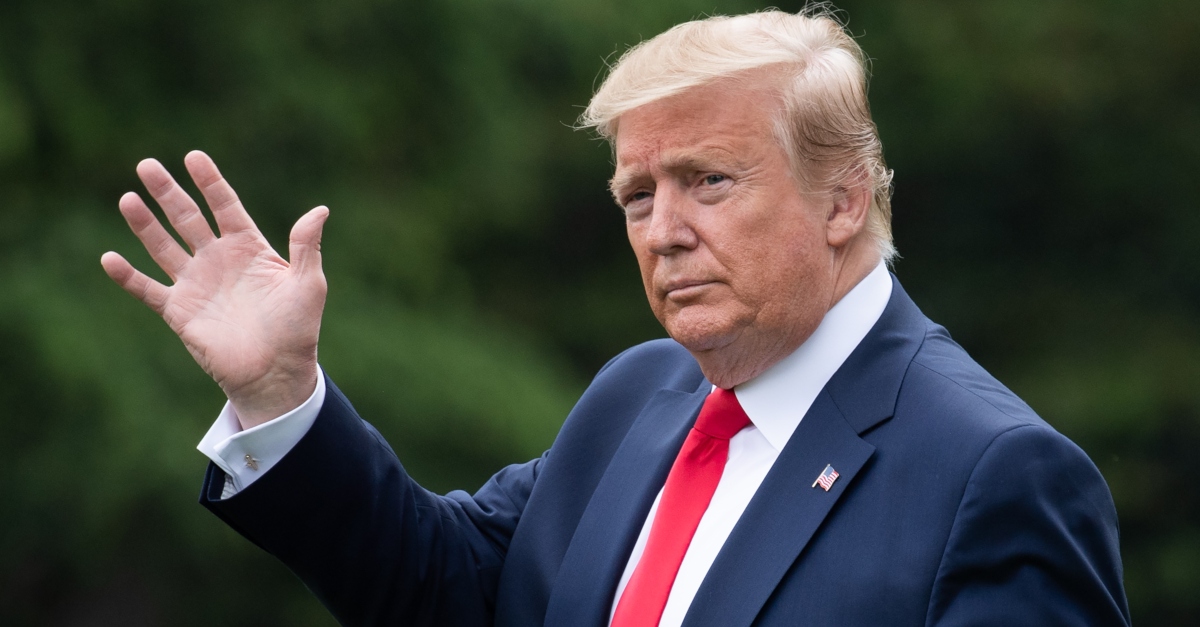
President Donald Trump has apparently shifted his opinion on the limits and reach of the power of the U.S. presidency.
In a series of late-morning Tweets, the 45th president railed against the authority wielded by his immediate predecessor Barack Obama.
“President Obama said that he did not have the right to sign DACA, that it will never hold up in court,” Trump wrote in two separate posts. “He signed it anyway! If the Supreme Court upholds DACA, it gives the President extraordinary powers, far greater than ever thought. If they do what is right and do not let DACA stand, with all of its negative legal implications, the Republicans and Democrats will have a DEAL to let them stay in our Country, in very short order. It would actually benefit DACA, and be done the right way!”
The shift for Trump here is drastic.
The White House has largely embraced the controversial “unitary executive” theory which argues that the U.S. president possesses absolute power and control over the entire executive branch.
Proponents of the unitary executive theory have long cited Article II of the U.S. Constitution as textual basis supporting the concept. Critics of the theory hold that it supplants the constitutional and democratic role played by the U.S. Congress.
Trump himself previously endorsed the theory that all-encompassing power is vested in the executive branch. During an interview with George Stephanopoulos regarding the potential firing of former special counsel Robert Mueller Trump referenced Article II:
Look, Article II, I would be allowed to fire Robert Mueller. There was not–assuming. Assuming I did all of the things. I said, ‘I want to fire him.’ Number one, I didn’t. He wasn’t fired. Okay, number one, very importantly. But more importantly, Article II allows me to do whatever I want. Article II would have allowed me to fire him.
Critics quickly took to knocking Trump’s volte-face on the subject.
The New Republic‘s law-focused writer Matt Ford noted: “It’s pretty telling that Trump, who’s said Article II means he can do whatever he wants, is arguing against greater presidential powers here.”
Former Acting Solicitor General of the United States Neal Katyal laid into Trump as well.
“OMG.
Supreme Court reporter Lawrence Hurley contextualized the shift:
President Trump, who has sought to exercise broad presidential power over immigration issues, says if DACA were found to be lawful by the Supreme Court, it would give the president “extraordinary powers.”
“Note: the Supreme Court does not have to decide whether DACA is/was lawful in order to resolve the case, which focuses on whether the Trump decision to rescind DACA was lawful,” Hurley added–suggesting that Trump’s departure here is a matter of convenience.
The Supreme Court is currently weighing whether Trump’s decision to end the program known as Deferred Action for Childhood Arrivals (DACA) was “arbitrary and capricious” under the Administrative Procedure Act. In the government’s own briefs, however, the Department of Justice is arguing that Trump’s decision is not reviewable–itself a broad assertion of executive authority.
Some commentators decided that simply mocking Trump was best:
“oh no don’t give me extraordinary powers” ?? https://t.co/e7ZSBhCN1M
— Elizabeth Joh (@elizabeth_joh) October 9, 2019
Georgetown Law Professor Marty Lederman took President Trump to task for another aspect of his Wednesday morning tweetstorm.
“It’s a small point in the grand scheme of insane recent things,” he tweeted, “But… President Obama didn’t ever say he (or Secretary [Janet] Napolitano) didn’t ‘have the right to [sign] DACA,’ nor did he sign it (the Secretary did, because it was her statutory authority).”
[image via via SAUL LOEB/AFP/Getty Images]